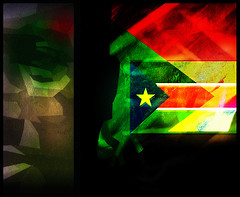WASHINGTON—When 4 million southern Sudanese faced a referendum for independence in January, they seemed to present a united front. Ninety-eight percent voted to separate from the northern government, with which they fought a brutal civil war for more than 20 years.
But since the nearly unanimous vote, clashes between the region’s 68 ethnic groups and political parties have resulted in more than 2,000 deaths. The nation celebrated its official independence Saturday, but underneath the jubilant surface are growing fears that it may soon descend into another civil war. Some aid organizations have gone as far as calling South Sudan a pre-failed state.
“They blamed their problems on the north for so long, it made things easy,” said Laura Jones, policy analyst at the Enough Project, a nonprofit agency that works to prevent genocide. “Now they look to [the new government] and say, ‘Okay what are you going to do about it?’”
“Their problems” start with the transition of the Sudan People’s Liberation Army/Movement from a rebel militia to a political party in a stable democracy. The top members of the new government, including its president, Salva Kiir, are all SPLA/M officials. And since the majority of the rebels-cum-politicians are from the Dinka tribe, smaller tribes fear they’ll be swept aside when it comes to representation in a wave of corruption.
During the 22-year civil war, millions of Dinka were forced to flee their traditional homelands for refugee camps in Ethiopia, Kenya and Uganda. When the Comprehensive Peace Agreement went into effect in 2005, many returned to find their homelands occupied by other tribes.
Peter Nhial, a Dinka man who now lives in Chicago, said his people are not trying to dominate but only want what was stolen from them.
“We are the majority, but we are not trying to take over. You can come to the parliament of South Sudan—it’s not all Dinka,” he said. “But there’s no way we’ll let [the disputed land] go. It belongs to us.”
Despite his position, Nhial is a strong advocate for peace in the new country.
Al-Jazeera English tells a different story. In May it reported that the government is currently fighting with seven armed militias in nine of the nation’s 10 states. In May SPLA/M forces burned Shilluk villages in former Dinka territory of Upper Nile State, and raped and tortured villagers. The government claimed they were rebels it had to disarm.
“They do have lots of problems with corruption, and they spend too much money on the military,” Jones said.
While the new constitution protects individual rights, minority tribes are also calling for group rights—legal protections for tribal cultures and development.
“I can see how people wouldn’t want only individual rights, but that’s also dangerous,” Jones said. “The more you recognize differences between groups, the more they think they’re different. How do you build a nation from that?”
Ethnic tensions are being stoked by rebel leaders, who are more interested in personal power than in ending supposed Dinka corruption, she said. And there is ample evidence they are getting arms from the northern government, which still claims several regions on the border, such as oil-rich Abyei and South Kordofan.
“There’s no smoking gun; we don’t see an actual exchange of weapons, but the [northern government]’s strategy is divide and conquer,” she said.
The militias are at least getting a safe haven and often heavily armed when they return, she said.
Vincent Chetiel, regional representative for United Nations High Commissioner for Refugees in Washington, also said different sides may be “fighting through proxies.”
The U.N.’s mandate for its mission in South Sudan ended on its day of independence. On Monday the Security Council voted to replace it with a peacekeeping force of 7,000, and as troops phase out Chetiel fears larger clashes will resume. Nhial wants them to stay in his country until all of the land issues are resolved, but pressure from Khartoum makes this unlikely.
In the event of a peacekeeping vacuum, help may come from an unexpected source: China.
China has incurred the wrath of human rights groups for years, claiming it props up the northern Sudanese government through billions of dollars in oil purchases. The government used the cash to fund its fight against the rebels, the human rights activists charged, making it responsible for the deaths of millions of southern Sudanese.
But with 80 percent of Sudan’s oil reserves lying underground in the south, peace in the new nation may be China’s new primary concern.
“China first and foremost protects its own interests. Now that there are two states, it’s necessary to get along with both. If they say: ‘You’ve got to stop attacking them,’ they’ll be more open to listen. Its dependency on oil could be positive,” Jones said.
China angered the government of South Sudan when it hosted Sudan President Omar al-Bashir in June. Bashir has had a warrant for his arrest issued by the International Criminal Court for war crimes, crimes against humanity and genocide since 2008. But it was also one of the first countries to recognize South Sudan’s sovereignty and is largely credited for getting the Bashir government to do the same.
For now, celebrating independence takes priority over the concerns. On Friday Jones and her co-workers at the Enough Project cracked open some champagne after work. On Saturday Nhial and his Dinka friends paraded through downtown Chicago. And Chetiel is optimistic that citizens of the newest nation are tired enough of war that they’ll work through their differences. But the celebration will be brief.
“Right now everyone’s really excited and have put their issues aside,” Jones said. “But it’s like the calm before the storm.”






